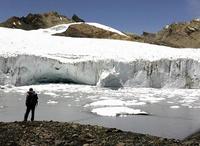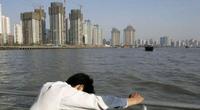-
Melting glaciers threaten Peru

Rising temperatures have caused glaciers in Peru to melt at alarming rates; Peru depends heavily on rivers fed by glaciers to provide drinking water, irrigation, and electricity; some scientists estimate that in ten years, whole glaciers will disappear entirely from the Andes; millions of Peruvians depend entirely on the glacier fed rivers as their primary source for water; the United States fears that water, food, and power shortages in Peru could cause stability and spark conflict across the region
-
-
Counterterror laws hobble monitoring of water supplies
Laws designed to protect the U.S. water supply are making it difficult for communities to maintain proper oversight over water companies and their use of water; the DHS has evidence that al Qaeda was looking to disrupt or contaminate the U.S. water supply; environmentalists who are concerned over water shortages or resource usage are having difficulty obtaining any information; officials admit that the laws are clumsy and are currently reviewing a system to make more data publicly available while protecting sensitive information like the location of wells
-
-
Sector Report for Monday, 7 February 2011: Infrastructure protection
This report contains the following stories.
Plus 1 additional story.
-
-
Protecting vital infrastructure as sea levels rise
As the world gets warmer, sea levels are rising; it has been happening at a snail’s pace so far, but as it speeds up more and more low-lying coastal land will be lost; at risk are many of the world’s cities and huge areas of fertile farmland; the sea is set to rise a meter or more by the end of this century, swamping much vital infrastructure and displacing hundreds of millions of people; scientists are looking at various ways to slow down or reverse the rise in sea levels — and of ways of coping with its consequences
-
-
Asia faces climate-induced migration crisis
Asians accounted for 89 percent of the 207 million people affected by natural disasters globally last year; Asian governments are currently focused on mitigating weather changes induced by climate change, but a new report from the Asian Development Bank says they should start laying down policies and mechanisms to deal with the projected population shifts; weather changes such as significant temperature increases, changing rainfall patterns, greater monsoon variability, sea-level rise, floods, and more intense tropical cyclones would force millions of people to flee their homes to safer havens within countries and across borders
-
-
Egypt's Internet blackout revives U.S. "kill switch" debate
Egypt’s five-day shutdown of the Internet has revived debate in the United States over how much authority the U.S. president should have over the Web in the event of a crisis; a bill pending before Congress would give the president the authority to shut down parts of the Internet in the event of a national security crisis such as a sustained enemy cyberattack on the U.S. national grid or financial systems; critics say this is a threat to civil liberties; “It’s not an Internet kill switch,” says one cyber expert; “But you can think about isolating certain domains or certain enterprises; say a big power company gets infected— You say to them, ‘Disconnect yourself before you infect other power companies’; It’s like an avian flu quarantine for the Internet”
-
-
Minnesota will see major floods in spring
Meteorologists project major floods in Minnesota this spring; emergency response officials warn that major roadways will likely be closed and are urging residents to immediately purchase flood insurance; officials are also encouraging residents to develop evacuation plans and to begin raising appliances off of basement floors; a third particularly rainy autumn followed by double the average amount of snow is to be blamed for the floods, as excessive snow melt will swell rivers in the spring; last year similar conditions caused rampant flooding and an estimated $28 million in damages
-
-
California dams plagued by seismic concerns
Half of Santa Clara County, California’s reservoirs cannot be filled to their full capacity due to seismic concerns; engineering tests revealed that in the event of a major earthquake the dam could slump sending a deadly tidal wave across densely populated communities; seismic retrofit costs to the county’s dam are estimated at $150 million; with the reduced capacity, the county’s dams must be maintained at 67 percent of its total capacity and cannot store more water in preparation for future droughts; the lost capacity could provide water for 280,000 people for a year
-
-
Megastorm could devastate California, not just earthquakes
A team of over 100 scientists, engineers, and emergency planners are urging California disaster planning officials to prepare for megastorms; the team projected that a catastrophic megastorm could decimate California with massive landslides and flooding; the findings were based on geological evidence of such powerful storms that occur every 300 years; the last megastorm occurred in 1861 and left the Sacramento Valley an “inland sea”
-
-
Scientist tackles China's "sinking cities" problem

A University of Nottingham researcher has been awarded funding to help China prevent human disaster as some of its fastest-growing cities sink under the weight of towering skyscrapers; one example: Shanghai, one of the most densely-populated cities in the world, is sinking at an average rate of between two centimeters to four centimeters a year, putting pressure on underground pedestrian and railway tunnels and building foundations
-
-
New York State prepares for sea level rise
More than 62 percent of New York State’s population lives in marine coastal counties; sea level in the Lower Hudson Valley and Long Island is projected to rise two to five inches by the 2020s, increasing 12 to 23 inches by the end of the century (up to 55 inches by the end of the century if accelerated polar ice melt occurs); New York Harbor has already experienced an increase in sea level of more than 15 inches in the past 150 years, with harbor tide gauges showing a rise of between four and six inches since 1960
-
-
Sector Report for Monday, 24 January 2011: Infrastructure protection
This report contains the following stories.
Plus 1 additional story.
-
-
Aussies flee more flooding
Flood water in northern Australia now cover an area larger than Germany and France combined; in addition to Queensland, large parts of the state of Victoria are now under water; around sixty towns across an area larger than Denmark to the north-west of the state capital, Melbourne, have been hit by floods as heavy rain from recent weeks makes its way across broad floodplains to the Murray River; the estimated damage in hard-hit Queensland now stands at US$19.8 billion
-
-
Rising sea waters threaten North Carolina's delicate coastline
A North Carolina science panel is predicting the sea level will rise by one meter by 2100; this means about 2,000 square miles of coastline that is a meter or less above water is at risk; on that land is some of the state’s most expensive real estate that economists say is worth a total of almost $7 billion
-
-
Mexico City's sinking is worsening
Scientists are alarmed by the extent to which Mexico City has sunk; over the last 100 years, parts of the city have sunk as much as forty-two feet — and sections of the city sink as much as eight inches a year; the sinking has caused the city’s sewage system to back up resulting in dangerous floods; the sinking is the result of water being pumped from the aquifer directly below the city more quickly than it is being replenished; Mexico City is built in the middle of Lake Texcoco, which has been drained
-
- All
- Regional
- Water
- Biometrics
- Borders/Immig
- Business
- Cybersecurity
- Detection
- Disasters
- Government
- Infrastructure
- International
- Public health
- Public Safety
- Communication interoperabillity
- Emergency services
- Emergency medical services
- Fire
- First response
- IEDs
- Law Enforcement
- Law Enforcement Technology
- Military technology
- Nonlethal weapons
- Nuclear weapons
- Personal protection equipment
- Police
- Notification /alert systems
- Situational awareness
- Weapons systems
- Sci-Tech
- Sector Reports
- Surveillance
- Transportation
Advertising & Marketing: advertise@newswirepubs.com
Editorial: editor@newswirepubs.com
General: info@newswirepubs.com
2010-2011 © News Wire Publications, LLC News Wire Publications, LLC
220 Old Country Road | Suite 200 | Mineola | New York | 11501
Permissions and Policies
Editorial: editor@newswirepubs.com
General: info@newswirepubs.com
2010-2011 © News Wire Publications, LLC News Wire Publications, LLC
220 Old Country Road | Suite 200 | Mineola | New York | 11501
Permissions and Policies
